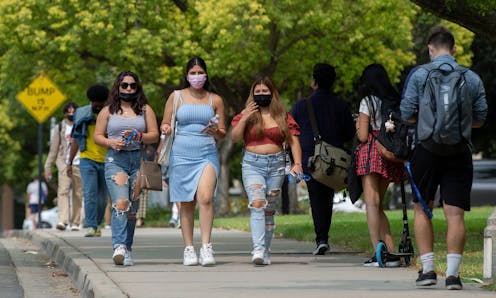What is Title IX? 4 essential reads
- Written by Kiersten Tate, Editorial intern

It has been five decades since President Richard Nixon signed Title IX of the Civil Rights Act into law. This 1972 federal law prohibits discrimination based on sex[1], sexuality and gender identity in schools or any educational programs that receive federal funding.
The Conversation U.S. asked scholars from different disciplines – including law, history and public policy – to write about a variety of topics related to Title IX, from sexual conduct on college campuses to the recognition of transgender people’s identity in schools.
Here are four selections from our past coverage.
1. Many sexual harassment and assault cases on college campuses go unreported
Jason Whiting[2], a professor of family therapy at Brigham Young University, analyzed tweets with the hashtag #WhyIDidntReport to understand why cases of sexual harassment and assault are not reported. The hashtag was trending after President Donald Trump criticized Christine Blasey Ford[3] for taking years to testify about then-Supreme Court nominee Brett Kavanaugh sexually assaulting her.
Whiting found that survivors of sexual assault faced various obstacles[4], such as feeling powerless or being reluctant to report faculty who teach courses that they need for their degrees. Whiting concludes that reporting needs to be met with people and institutions who listen to survivors.
Read more: Tweets show what hinders reports of sexual assault and harassment on campus – and why the new federal Title IX rules may be a step back[5]
2. Trans rights in high school sports
In response to Idaho’s law banning trans athletes[6] from high school sports, Elizabeth A. Sharrow[7], a public policy professor at UMass Amherst, described the history behind Title IX and the expansion of options for girls’ and women’s sports.
She wrote that policymakers resisted the push for girls and women to participate in coed sports, which girls and women would use to prove their athletic equality to boys and men. Instead, schools had to create girls’ and women’s teams[8]. “The U.S. courts ruled against cisgender boys and men – those assigned male at birth and who live as boys and men – who wanted to play on teams for girls and women,” wrote Sharrow. “Research shows that the legal reasoning … advances the dubious notion that girls are inherently inferior athletes.”
Read more: How high school sports became the latest battleground over transgender rights[9]
3. College employees and their history of sexual harassment
Susan Fortney[10], a law professor at Texas A&M University, and Theresa Morris[11], a sociology professor at Texas A&M University, looked into the national problem for colleges known as “pass the harasser,” when university employees who committed sexual harassment are able to move on to the next job without disclosing their past.
They found that “passing the harasser”[12] occurs when colleges do not seek information about sexual misconduct when hiring a new person. Another way “passing the harasser” happens is in colleges not providing information about an employee’s history of sexual harassment to another school that wants to hire the employee.
Some universities are making changes to the screening process for new hires so that they can tackle this problem. For example, the University of California, Davis, and schools in the University of Wisconsin system require references and final candidates for a job to answer questions about whether or not a candidate engaged in sexual violence. “Unless colleges and universities across the country adopt similar principles and practices,” wrote Fortney and Morris, “hiring schools may not be able to find out if the people they are hiring have a history of sexual misconduct.”
Read more: Colleges routinely fail to ask about new hires' history of sexual harassment[13]
4. Affirming trans students’ gender identities in school
Genny Beemyn[14], director of the Stonewall Center[15] at UMass Amherst, described the current legal battles for trans rights in schools as “a matter of life and death.”
Because of the stress from discrimination, trans students are more at risk for depression[16], anxiety and suicidal attempts than cisgender youths, and trans youths who experienced more discrimination were more likely to attempt suicide than their trans peers who experienced less discrimination, Beemyn wrote.
The differing opinions between the Obama, Trump and Biden administrations on whether Title IX protects trans people also makes the rights of trans students murky. “Regardless of what state or federal law or the courts may say about whether educators must refer to students by the pronouns they use for themselves,” Beemyn wrote, “there is strong evidence that doing so – or not – can drastically affect students’ mental health.”
Read more: Legal fights persist over policies that require teachers to refer to trans students by their chosen pronouns[17]
Editor’s note: This story is a roundup of articles from The Conversation’s archives.
References
- ^ prohibits discrimination based on sex (www2.ed.gov)
- ^ Jason Whiting (scholar.google.com)
- ^ President Donald Trump criticized Christine Blasey Ford (www.c-span.org)
- ^ various obstacles (theconversation.com)
- ^ Tweets show what hinders reports of sexual assault and harassment on campus – and why the new federal Title IX rules may be a step back (theconversation.com)
- ^ Idaho’s law banning trans athletes (www.reuters.com)
- ^ Elizabeth A. Sharrow (scholar.google.com)
- ^ girls’ and women’s teams (theconversation.com)
- ^ How high school sports became the latest battleground over transgender rights (theconversation.com)
- ^ Susan Fortney (scholar.google.com)
- ^ Theresa Morris (scholar.google.com)
- ^ “passing the harasser” (theconversation.com)
- ^ Colleges routinely fail to ask about new hires' history of sexual harassment (theconversation.com)
- ^ Genny Beemyn (www.gennyb.com)
- ^ Stonewall Center (www.umass.edu)
- ^ more at risk for depression (theconversation.com)
- ^ Legal fights persist over policies that require teachers to refer to trans students by their chosen pronouns (theconversation.com)
Authors: Kiersten Tate, Editorial intern
Read more https://theconversation.com/what-is-title-ix-4-essential-reads-186173

